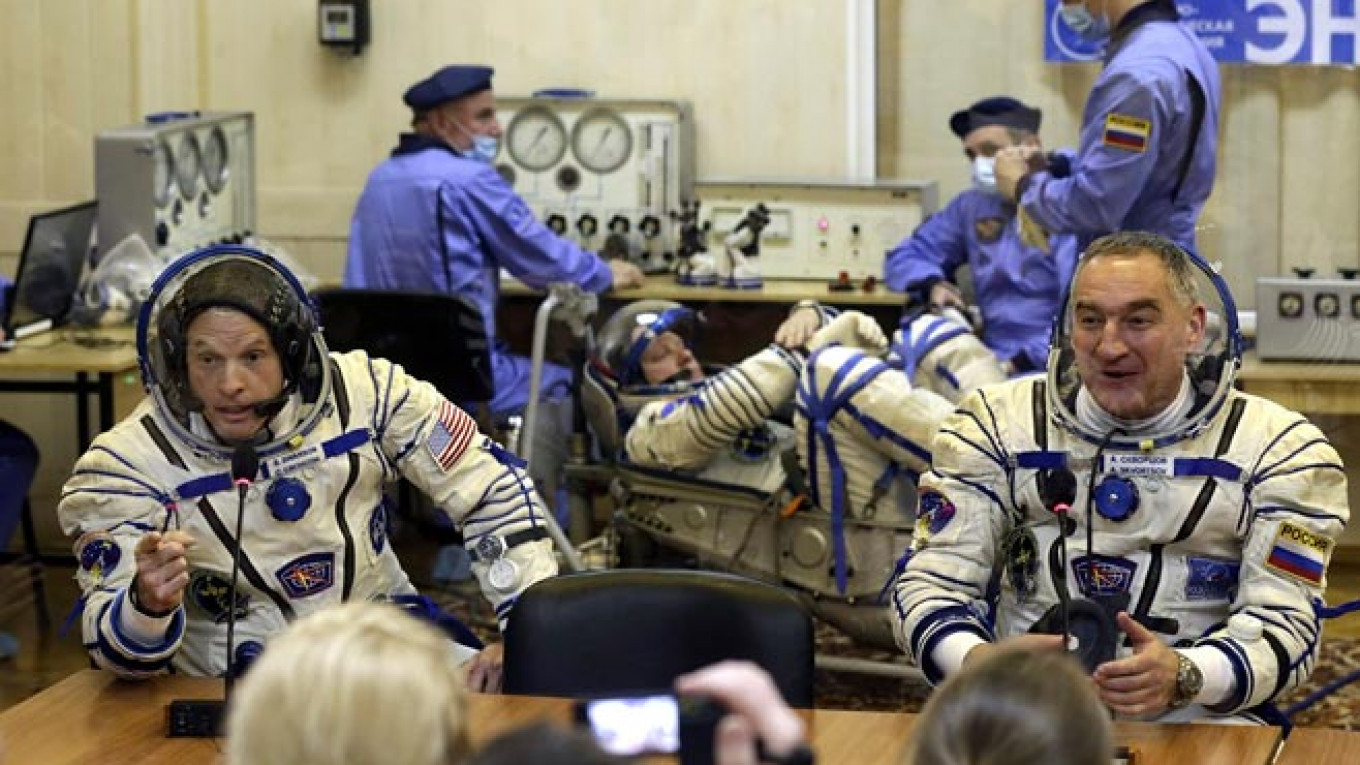As the fallout over Russia's annexation of Crimea continued Thursday, the National Aeronautics and Space Administration was added to the U.S. list of entitites forbidden from cooperating with Russian agencies, meaning even space cooperation — recently hailed for being "above politics" — has suffered.
Despite the fact that the U.S. has frozen most bilateral cooperation on space, peaceful atomic energy and law enforcement, however, Russian experts have been downplaying the impact of the new U.S. sanctions.
"We already have not had significant cooperation with the U.S. except for issues of missile and defense security," Andrei Klimov, first deputy head of the Federation Council's International Affairs Committee, said by phone Thursday.
Dmitry Suslov, deputy director of the Center for Complex European and International Studies at the Higher School of Economics, a state university, echoed senator Klimov.
With the exception of cooperation on Afghanistan, Russia and the U.S. "have not seen really advanced cooperation," Suslov said by phone, so the new sanctions "will have no tangible impact on Russia's security in the short term."
In separate statements late Wednesday and Thursday, the U.S. government announced restrictions on joint operations with Russia in a number of spheres, including space exploration, missile defense, Afghanistan, peaceful atomic energy and law enforsement cooperation.
The latest round of sanctions mark a new attempt by the U.S. administration to prevent Russia from further action in Ukraine after annexing the territories of Crimea and Sevastopol in March, in a referendum that the West believes was illegal. The sanctions also come after NATO expressed concerns about the presence of Russian troops on Ukraine's border in recent days and warned of a possible incursion.
President Barack Obama was scheduled to meet with top lawmakers about the situation in Ukraine late Thursday, The Associated Press reported.
NASA, a U.S. government agency, "is suspending the majority of its ongoing engagements" with Russia, except for work "to maintain safe and continuous operation" of the International Space Station, NASA said on its Facebook page Thursday.
But even cooperation on the ISS may be abolished in 2017, as NASA is looking to launch human space flights from its soil.
NASA said it made the decision to suspend cooperation in connection with Russia's "ongoing violation of Ukraine's sovereignty and territorial integrity."
Separately, the U.S. government "has temporarily suspended several projects planned under the auspices of the U.S.-Russia Bilateral Presidential Commission as well as some cooperative law enforcement activities," the State Department website said, without elaborating.
Although the State Department's statement on the matter did not have a date, Russian news agency Interfax cited the State Department on the news late Wednesday.
The spending that had been allocated for the cancelled activities within the U.S.-Russia Bilateral Presidential Commission will instead be given to Ukraine to "support economic reform and address other pressing needs, including combatting corruption and recovering stolen assets," the State Department said on its website.
In addition, the U.S. has suspended "certain joint projects in the peaceful use of atomic energy" with Russian state nuclear corporation Rosatom, such as "technical meetings on scientific topics," the Russian agency said on its website in English on Thursday.
Rosatom condemned the U.S. government's decision to halt interaction, calling it a "mistake."
"Nuclear power is a very delicate and serious matter. It requires a responsible and professional approach on the part of all participants in terms of international cooperation. Politics should have no place in this field," Rosatom said.
Asked to comment on the new U.S. sanctions at a press briefing Thursday, Deputy Foreign Minister Sergei Ryabkov said the U.S. was "trying to demonstrate its rejection of the free choice of the Crimean population and the decisions that we have taken in this regard," Ryabkov said, the Foreign Ministry reported.
Ryabkov said Washington was "cutting off contacts even on the issues … where it is in the interests of the U.S. to continue the dialog," Ryabkov said.
Ryabkov also advised U.S. officials against "winding themselves and others up" because "the ship has sailed," suggesting that they instead "practice yoga, stick to food-combining diets, maybe watch some comedy sketch shows on television."
Continuing the spat with the U.S. on Thursday, Foreign Minister Sergei Lavrov accused U.S. ships of repeatedly violating the allowed duration of their stay in the Black Sea, saying Russia would "be attentively following" their actions, Lavrov told a news conference, state news agency Itar-Tass reported.
Contact the author at [email protected]
A Message from The Moscow Times:
Dear readers,
We are facing unprecedented challenges. Russia's Prosecutor General's Office has designated The Moscow Times as an "undesirable" organization, criminalizing our work and putting our staff at risk of prosecution. This follows our earlier unjust labeling as a "foreign agent."
These actions are direct attempts to silence independent journalism in Russia. The authorities claim our work "discredits the decisions of the Russian leadership." We see things differently: we strive to provide accurate, unbiased reporting on Russia.
We, the journalists of The Moscow Times, refuse to be silenced. But to continue our work, we need your help.
Your support, no matter how small, makes a world of difference. If you can, please support us monthly starting from just $2. It's quick to set up, and every contribution makes a significant impact.
By supporting The Moscow Times, you're defending open, independent journalism in the face of repression. Thank you for standing with us.
Remind me later.






